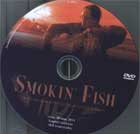
Smokin’ Fish 2011
Distributed by Documentary Educational Resources, 101 Morse Street, Watertown, MA 02472; 617-926-0491
Produced by Luke Griswold-Tergis
Directed by Luke Griswold-Tergis and Cory Mann
DVD, color, 80 min.
Sr. High - General Adult
Anthropology, Native Americans, Sociology
Date Entered: 08/21/2014
Reviewed by Cliff Glaviano, formerly with Bowling Green State University Libraries, Bowling Green, OHThis is the story of Cory Mann (Native American name: Gutchquena Shungukayde), a half white, half Tlingit fabric designer and importer living in Anchorage, Alaska. Each year, Cory suspends his import business in order to spend two months in Klukwan, Alaska, catching, smoking, and distributing salmon to his relatives. Cory was raised by his grandmother, Lily, learning the Tlingit way of life, but learned and lived the white man’s way in and after college.
This is a fascinating look at Tlingit culture, traditional and present day, centered on the harvesting of salmon, the Tlingit’s most important food source. Not only are viewers able to see Cory Mann and his relatives catch and smoke salmon the Tlingit way, with ritual cutting of the salmon and ritual arrangement in a traditional smokehouse, the relationship between the Tlingit and nature, especially their appreciation for the salmon species, is explained and demonstrated. The history of the Tlingit and Cory’s Thunderbird Clan is told through narrative and interviews with Mann’s relatives, enhanced by views of museum photographs, artifacts and home movies. The cinematography is gorgeous. The editing and sound are excellent.
Throughout the two month period that Mann pursues fishing as part of his Tlingit heritage, paying back some of what his family has given him, there are constant reminders of how ill-used and underappreciated aboriginal cultures are and have been to white civilization. Cory is hassled for missing a tax payment on his import business, is forced to try to obtain a permit to fish his traditional waters, and relates other instances of cultural misunderstanding including the destruction of his grandmother’s smokehouse to make way for a highway … though it seems crazy to the Tlingit, it’s also an indication of how the white government still fails to try to accommodate native cultures in today’s Alaska. This film is highly recommended as an exploration of Tlingit culture that can also serve as a starting point for a detailed discussion of cultural understanding and cultural appreciation in an increasingly multicultural world.